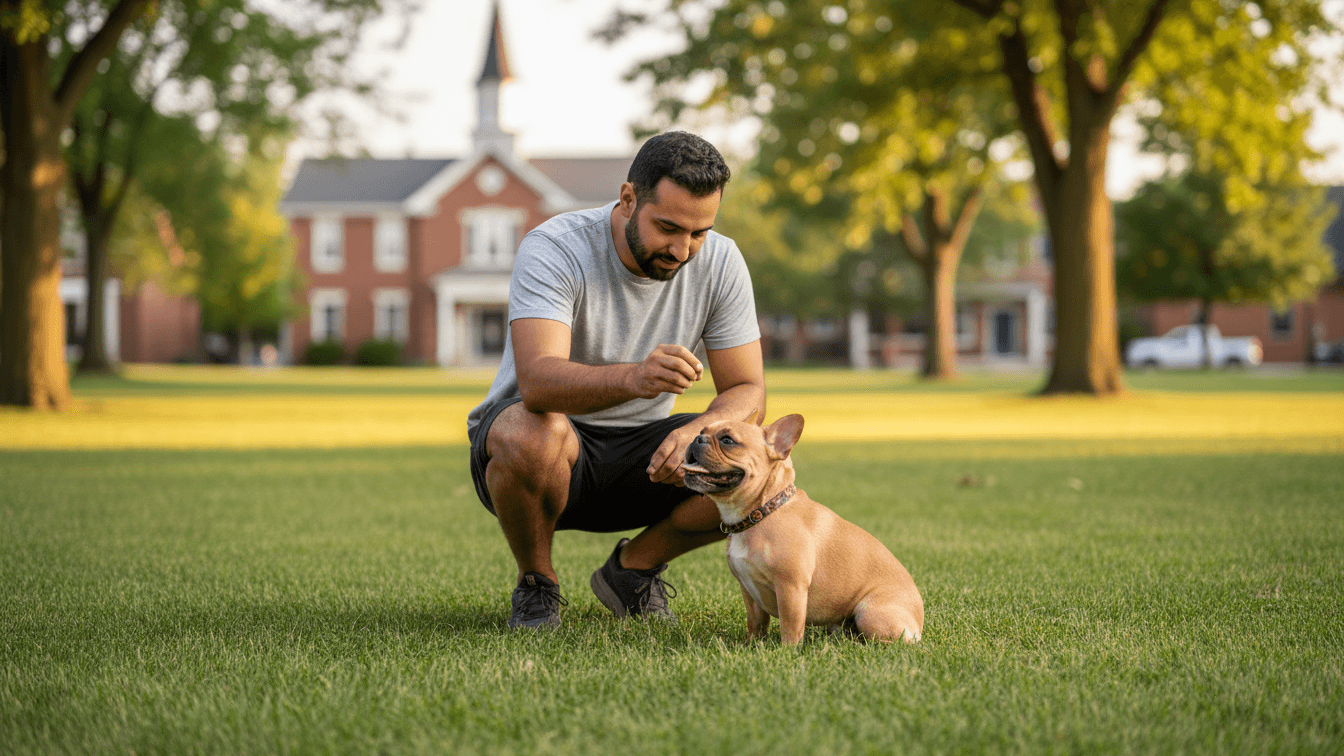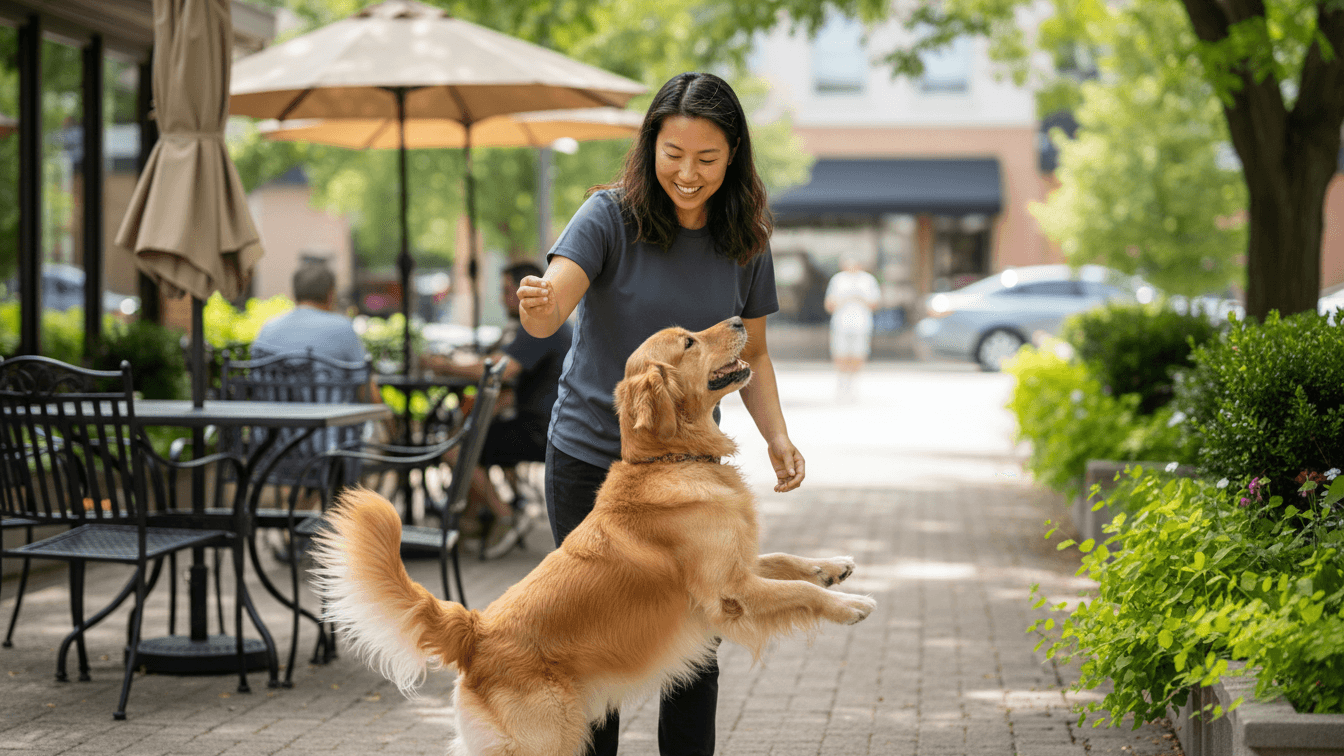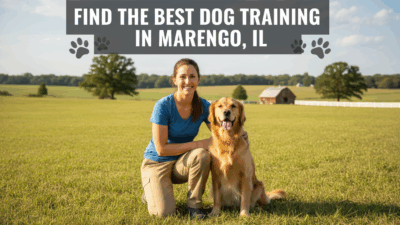Your Complete Guide to Choosing a Dog Trainer in Marengo, IL and Surrounding Areas
Living with a dog in Marengo means navigating a small-town atmosphere with plenty of outdoor space but limited public amenities compared to bigger cities. Your dog needs to handle encounters with farm animals along rural roads, stay calm during community events like Indian Creek Days, and behave politely when you visit local businesses along Route 20.
Since Marengo sits in McHenry County, local rules follow both town ordinances and county regulations. When you find a professional dog trainer who understands these local details, you’ll get better results both at home and out in your community.
How to Choose the Right Trainer
Start by looking for someone who uses positive reinforcement training and can set realistic goals for your Marengo lifestyle. This means your dog should learn to walk calmly on quiet residential streets, stay focused around wildlife and livestock, and handle vet visits without drama.
Credentials give you a quick way to compare trainers’ experience levels. Common dog trainer certifications include KPA-CTP, CPDT-KA, or IAABC-CDBC for behavior problems. If your dog has serious aggression issues, look for someone with CBCC-KA or a science-based program like CTC.
In-home dog training works great for puppy training, door greetings, and neighborhood leash skills. Group classes make sense once your dog can focus around other dogs, which is especially helpful if you plan to visit nearby parks or attend local events.
Common Dog Training Methods Explained

Reward-based methods build the trust you want while creating lasting behavior changes. They also help you follow Marengo’s rules about keeping dogs under control in public.
Basic obedience covers sit, down, stay, place, recall, and leash training so your dog can handle walks, outdoor dining, and park visits without pulling or jumping on people.
Puppy classes focus on socialization, potty training, bite control, crate comfort, and early leash skills. Starting with short, positive sessions prevents bad habits from forming in the first place.
Behavior modification addresses fear, reactivity, resource guarding, or separation anxiety through careful desensitization and counterconditioning. For serious cases, ask if your trainer works with local veterinarians.
Private lessons and in-home sessions let you customize everything around your daily routines, while board and train can speed up results when you’re short on time.
Dog training classes help your dog practice good manners around other dogs and people. The best classes give dogs plenty of space, screen participants carefully, and teach calm behavior rather than just excitement.
Specialized training like therapy dog training or service dog training requires extra structure, public-access skills, and a very clear step-by-step program.
Stay away from trainers who use fear, intimidation, or pain to get results. Humane methods are safer for everyone, easier to maintain long-term, and much better for keeping peace with your neighbors.
Average Cost of Dog Training in Marengo, IL and Surrounding Areas (Updated for 2025)
Prices around Marengo and McHenry County depend on the trainer’s experience, how long training sessions last, and where the training happens. Here’s what most local pet owners are paying in 2025.
| Service Type | Average Cost (Marengo/McHenry County) |
|---|---|
| Puppy classes (4-6 weeks) | $140-$260 total |
| Group obedience training (4-6 weeks) | $150-$290 total |
| Private lessons (60-90 min) | $100-$180 per session |
| In-home coaching packages (4-6 visits) | $400-$850 total |
| Board and train (2-4 weeks) | $1,900-$4,200 total |
| Behavior consult for reactivity/anxiety (initial) | $140-$230 |
You’ll probably pay extra travel fees for longer distances within McHenry County, and expect higher rates for complex behavior work. Some expert dog trainers in the area may offer a free consultation or free evaluation before you commit to a full training program.
Make sure you understand what’s included in each dog training services package, how the trainer tracks progress, and whether they require any upfront deposits.
Questions to Ask a Potential Dog Trainer
- What training methods do you use, and how do you keep sessions positive and low-stress?
- What credentials do you have, like CPDT-KSA? Do you keep up with continuing education?
- How will you customize the training program for my dog’s specific needs and our Marengo lifestyle?
- Do you offer in-home visits, group classes, or board and train, and which approach fits my goals best?
- How will we measure my dog’s progress and know when to add more distractions?
- What are the total costs, including any travel fees, and what’s your cancellation policy?
- Do you carry liability insurance, and can you show me proof?
- For behavior problems, will you work with my veterinarian if needed?
- What should I practice between our sessions to help your dog keep improving?
Local Marengo Rules and Considerations for Dog Owners
Marengo enforces leash laws and nuisance rules to keep parks and neighborhoods safe for everyone. McHenry County follows Illinois state public health requirements too.
Dogs must be on a leash when in public areas throughout Marengo. The town ordinance requires owners to keep dogs under control and prevent them from running at large.
Illinois law requires current rabies vaccination for all dogs. You can get these through county clinics or your regular vet. The McHenry County Animal Control handles lost pets, licensing information, and animal welfare concerns.
Excessive barking can be considered a nuisance under Marengo ordinances, so work with your trainer on alert barking and separation anxiety before neighbors start complaining. If your trainer wants to use town parks for commercial sessions, they may need permits and proof of insurance.
Illinois doesn’t require special licenses for dog trainers, but certified dog trainer credentials demonstrate a commitment to professional standards and continuing education.
Local Marengo and Surrounding Areas Resources for Dog Owners
These spots give you great places to practice polite manners, work on recalls, and provide safe enrichment for your dog. Always follow the posted rules and etiquette guidelines.
- Indian Oaks Park offers open space for leashed walks and socialization opportunities with proper supervision
- Prairie Grove Reservoir Conservation Area welcomes leashed dogs on trails, perfect for building focus around wildlife
- Marengo Ridge Conservation Area provides natural settings for leash training and practicing recall on long lines in less crowded spaces
For dog owners willing to drive a bit, McHenry County offers several additional conservation areas where leashed dogs are welcome on trails.

FAQs
How much does in-home dog training cost?
Most Marengo-area trainers charge $100-$180 per in-home visit, with discounts available when you buy packages. Behavior problems typically start at the higher end of that range.
Is in-home dog training worth it?
Absolutely, because you’re working on problems exactly where they happen. Your trainer can fix door manners, jumping on guests, counter-surfing, and yard reactivity right at home, then step outside to practice leash skills on your actual neighborhood streets.
Can you pay someone to house train your dog?
Yes, many trainers offer puppy programs that include potty training, crate routines, and daily schedules. Board and train programs can speed up the process while teaching you how to maintain the progress.
What is the 3-3-3 rule for dog training?
This is a helpful timeline for new or adopted dogs: expect about 3 days for your dog to decompress, 3 weeks to learn your routines, and 3 months to feel completely settled. Good training programs work with this natural adjustment period.
How long will it take to reach my training goals?
Most puppies and friendly adult dogs show solid progress within 4-8 weeks if you practice daily. Fear, reactivity, or aggression typically requires several months of careful behavior modification with gradual increases in difficulty.
What should I bring to group classes?
Pack a flat collar or harness, a 6-foot leash, high-value treats, water, and current vaccination records if your trainer requests them. Leave retractable leashes at home for safety reasons.
What’s the leash law in Marengo?
Dogs must be leashed and under control in all public areas within Marengo. The town prohibits dogs from running at large, which means your dog needs to be secured on your property or on leash when off your property.
Do I need a dog license in Marengo or McHenry County?
McHenry County does not require general pet licenses for dogs, but you must keep your dog’s rabies vaccination current. Contact McHenry County Animal Control for specific county requirements and services.
What shots does my dog need in McHenry County or Illinois?
Rabies vaccination is required throughout Illinois. Your veterinarian may also recommend distemper-parvo and bordetella based on your dog’s lifestyle and exposure to other dogs in training for dogs or socialization settings.
Are dog trainers required to be licensed in Marengo or McHenry County or Illinois?
No special trainer licenses exist in Illinois. Trainers follow normal business regulations, but professional certifications show a commitment to education and ethical standards in dog obedience training.
Where can I practice off-leash recall?
The safest option is to use a fenced area on private property with permission. Public areas in Marengo require leashes, so consider using a long training line in open conservation areas to practice recall while staying compliant with local rules.
Which dog parks allow training around Marengo and surrounding areas?
Marengo doesn’t have a dedicated fenced dog park within town limits. For off-leash practice in a controlled environment, you’ll need to travel to nearby communities in McHenry County that offer fenced dog park facilities.
What trails allow dogs for training?
Prairie Grove Reservoir Conservation Area and Marengo Ridge Conservation Area both welcome leashed dogs on their trails. These locations are perfect for teaching calm focus around wildlife, other hikers, and natural distractions while building your well-behaved dog.
What should I look for in aggressive dog training?
Look for a trainer who specializes in behavior modification and avoids punishment-based methods. The best approach for reactivity and aggression uses careful desensitization, counterconditioning, and management strategies that keep everyone safe during the process.
How do I know if my dog needs behavior modification vs basic obedience?
If your dog shows fear, aggression, severe separation anxiety, or reactivity toward people or other dogs, behavior modification is the right path. Basic obedience works for dogs who are friendly and social but need better manners and impulse control.
The right combination of thoughtful planning, humane methods, and consistent practice around Marengo’s neighborhoods and conservation areas will help your dog become a confident, well-behaved companion. Whether you choose private lessons, group classes, or board and train, the best dog training starts with finding a top dog professional who understands both your goals and your local community.
